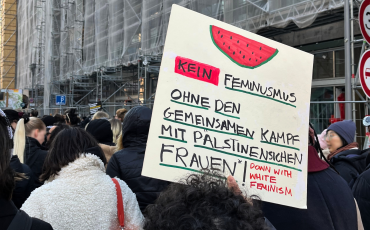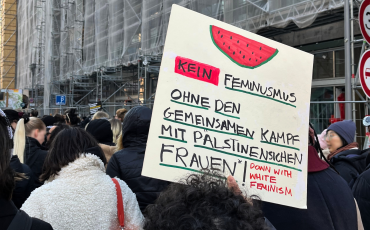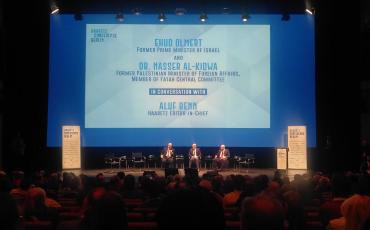Since the end of June, Palestinians in the West Bank have been protesting their government. dis:orient spoke with an activist about the current protests.
In the past few months, protests against the mass evictions in East Jerusalem have continued, responding in particular to the threat of house demolitions in Silwan. Compared to May, the general situation has calmed, but under the new Israeli Prime Minister Naftali Bennett, many triggers of the protests remain. While the situation inside Palestinian cities in the West Bank has remained comparatively calm over the past few months, major protests against the Palestinian government broke out in these areas at the end of June. Dis:orient spoke with Leyla*, an activist involved in the protests in the West Bank. She discusses the current situation, the PA's relationship with the broader society, and the role of the Oslo peace process.
What triggered the latest round of protests? What are people demanding?
Leyla*: On Thursday, June 24th, Nizar Banat, who is a political commentator and known for his critique and protest against the PA, was assassinated by their security forces. They entered his home in Hebron and beat him up in an extreme, excruciating manner. They took him into their vehicle only for him to be pronounced dead two hours later. That is why people have been going to the street to protest the murder of Nizar Banat.
For the Palestinians, this was the last straw. We have been tolerating assassinations and policing our whole lives. The PA is running security coordination with Israel and helps them to arrest Palestinians. We have had no sense of security or protection our whole lives. For us, these protests are not just about Nizar Banat. We had to go to the streets to demand the dismantling of the PA, as well as justice for Nizar Banat.
If it's not just about Nizar Banat, what are the underlying reasons for discontentment with the PA?
The creation of the PA did not include Palestinians as a whole, but rather shaped a class of people. Palestinians working for the PA in the public or security sector often belong to the political party Fatah — this is especially true of those in positions of greater power. Examples are Majed Faraj, the head of the General Intelligence Service, Mahmoud Abbas, the President of the PA, and most other heads of institutions.
The marginalization of other factions, especially Islamic and leftist ones, is a main reason for the declining popular support for the PA. Of course, the Fatah community – the largest faction in Palestine – still backs them. Belonging to Fatah means that you are guaranteed a certain set of privileges, whether in the public or political sector. This creates a kind of political economy and material reality, totally different from the one experienced by those outside of Fatah. The PA, of course, is not only made of Fatah, but they play a crucial role. The current protests against the PA are more directed towards the hegemony of Fatah in the PA itself.
In May, many activists spoke of a reunification of Palestinians in all different places of Historic Palestine, from Haifa and Jerusalem to Ramallah. Now Palestinians in East Jerusalem face demolitions and threat of eviction, while Palestinians in the West Bank face police violence by the PA. What is left of this perceived “reunification”?
In my view, the fragmentation of Palestinians has two layers. One is a geographical split into four spaces – the West Bank, Gaza, ’48 [Territories of the state of Israel since 1948, ed.] and Jerusalem. Each of them face their own set of laws, rules and oppression. The other fragmentation is the division between Hamas and Fatah.
When we talk about unity, we do not necessarily mean the flawed understanding of unity between Fatah and Hamas, because the political situation created through Fatah and the PA is what caused the division. Unity of Palestinians for us is the unity on the ground between those people living in Gaza, the West Bank, Jerusalem, ‘48, and the diaspora. Unity for us means to uphold an anti-colonial nationalism, threatened by this fragmentation.
The protests in May showed that Palestinian nationalism is alive, and that there still is a sort of unity. The mandate of the PA is only for the West Bank – in many ways their legitimacy and political system is built on the division of the Palestinians. What causes this kind of division is basically the policing of Palestinian people through the PA. We want to actually dismantle the cause of this kind of division.
What demands follow from that – the abolition of the PA?
Palestinians are not in agreement about whether we want concessions that are achievable right now, or whether our demands should go further. There are people calling for the dismissal of certain individuals in the PA, including the president. Others demand the dismantling of the whole PA. The end of the security coordination is always one of the major demands, as well as the investigation of corruption within the PA. The streets are pretty much divided, but for now I would say justice for Nizar Banat is a priority. And the movement does not end if the larger demands are not met at this point. At least we now know that the anti-corruption and anti-PA movement is alive.
The PA was established through the Oslo-Accords and since then has been a central institution of cooperation with states, international organizations, and NGOs, but also with Israel for instance through the security cooperation. Are the protests and their demands in a sense a child of the Oslo accords? If yes, how?
Palestinian public opinion about Oslo has long been characterized by scrutiny and contestation. Many never believed in the peace process. It did not end the settlement enterprise, it did not end the killing and imprisonment of Palestinians, it did not end the assassinations, nor the siege on Gaza. For us, the peace process has been dead for a long time. Mainly those gaining material benefit from Oslo are the ones still believing in it.
On top of that, the Israelis and international community want the peace process to remain. The Oslo peace process is a microcosm of the international effort to subjugate Palestinians into this peace effort. Kind of like ‘Here, you need to make peace. You need to focus on peace. Uh, no resistance. We are funding your NGOs, we are funding your institutions, but make sure that you don't resist. Don't do anything violent.’ It is a system that is trying to peace-wash the Palestinian struggle.
Since the Oslo Accords, the vision of the International Community has been peacebuilding through state building. Germany has, in the last months, once again emphasized the need for a two state-solution as Oslo proposed, and a lot of funding has gone into the PA and their institutions for these ends. How do you explain the attachment to this framework from the international community?
When it comes to the understanding of Palestine and Israel, I would say the international community is quite naive. I am not saying that they do not have enough reports and data to have a position on things. Their understanding of intractable conflicts has obviously been the same for years. Intractable conflicts cannot be transcribed into one state or two state solutions. It is a no solution situation. All these attempts to export all kinds of peace processes or conflict resolution methods do not realize that in our situation, they are not applicable. Not because our situation is special, but because our situation is an intractable asymmetrical international conflict. It is a struggle against settler-colonialism. For Palestinian people there is no other way to put it.
But there are also Palestinians who support exactly this sort of peacebuilding through state building, probably foremost the PA itself.
Yes, one of their strategies of state building is called Fayyadism. Salam Fayyad, former minister of the PA, proposed to strengthen NGOs — especially in the rural areas of the West Bank — to improve the livelihood of the communities. The NGOs’ services help Palestinian people to remain in their communities and above the poverty line. That led to a situation in which people stopped resisting, because they have food and work, and they have other priorities. But this depoliticization and forgetting of the ongoing oppression within this kind of state building, even initiated by Palestinians, is dangerous. State building is not just simply a thing that the international community wants to impose. The PA also wants to impose that on the Palestinians.
As you are touching on the topic of NGOs, in the years after Oslo, the number of NGOs rose enormously, and have transformed civil society in many ways, a process sometimes referred to as NGOisation. What is their role in the current protest movement?
There was a large backlash from many human rights NGOs against the PA for the violent ways they deal with the protestors. They throw tear gas canisters and sound bombs and beat people with sticks. They use intimidation tactics, for instance they take the phones of the people documenting the protest and smash them to the ground or steal them and publish private photos on the web. NGOs such as Al-Haq and Al-Dameer report of people whose phones were destroyed and those who were sexually harassed.
Several NGOs are collecting data for investigations, but the investigations will be done by the PA. We do not know if the PA will indict itself. The large number of NGOs that evolved during the last decades now report on human rights violations, as this is their jurisdiction. Now the PA might regret their reliance on NGOs. Whether they like it or not, whether they think they have successfully transferred their agenda to these NGOs or not, these NGOs will end up following their jurisdiction.
There are many people who argue that NGOisation produces depoliticization, can you comment on this?
I would say the protests were driven more by popular movement. The people working in NGOs who I know were in the streets, documenting but also participating in the protests. But for Palestinian NGOs in general, it is hard to say that they were depoliticized. NGOs in Palestine are pretty involved in politics, and that is not something that the Palestinians are ashamed of. So yes, there is an aim to depoliticize NGOs in Palestine, but I would never say that it was successful at least for the major ones, which enjoy popular support within the society.
To go back to your argument before, the Fayyad plan relied on NGOs — on one side, the PA is relying on NGOs, especially to enforce policies in the areas in the West Bank which are outside of their jurisdiction. But at the same time Palestinian NGOs, for instance the Palestinian NGO-Network, have positioned themselves against the PA. Could you explain how this relationship works out in practice?
For instance, recently the PA made a call to release all of the information about the NGOs’ funding, as well as their projects. But the Palestinian NGO-Network protested this move, and eventually it was canceled. The PA wanted to control the NGOs, because Al-Haq and Al-Dameer and many other organizations document human rights violations of the PA. At the same time, the PA needs the reports of these NGOs — for instance, in the current trial at the International Criminal Court against Israel. They need these organizations to do the research for them, but at the same time they try to limit their work and monitor them. NGOs on the other hand are active in resisting this attempt to control them.
How do you consider the success of the protests?
Obviously, there is a risk of larger violence, but the status quo is violent, too. I would not say that we are as worried about violence, as much as we are worried about a political vacuum in which people we do not back seize power. But this is something that we must consider in our agenda and strategies against the PA and settler-colonialism.
*Name changed





















